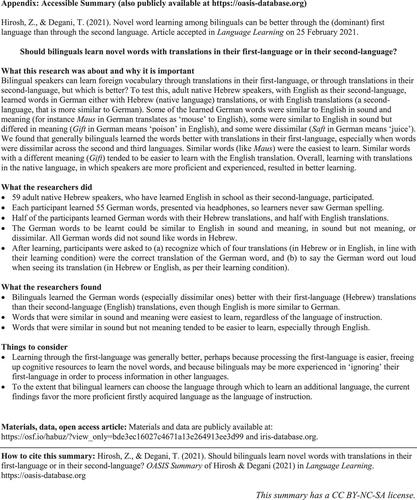当前位置:
X-MOL 学术
›
Lang. Learn.
›
论文详情
Our official English website, www.x-mol.net, welcomes your feedback! (Note: you will need to create a separate account there.)
Novel Word Learning Among Bilinguals Can Be Better Through the (Dominant) First Language Than Through the Second Language
Language Learning ( IF 5.240 ) Pub Date : 2021-07-10 , DOI: 10.1111/lang.12457 Zoya Hirosh 1 , Tamar Degani 1
Language Learning ( IF 5.240 ) Pub Date : 2021-07-10 , DOI: 10.1111/lang.12457 Zoya Hirosh 1 , Tamar Degani 1
Affiliation

|
When learning novel vocabulary in a third language (L3) through translations in the first language (L1), bilinguals may have more available cognitive resources and more accumulated experience in language regulation compared to when learning through translations in the second language (L2). In a study designed to test language of instruction (LOI) effects, 59 Hebrew–English bilinguals auditorily learned over two sessions 55 words in German, including three word types: cognates, overlapping in form and meaning between English and German; false cognates, overlapping in form but not meaning; and controls. Critically, half of the participants learned through their (dominant) L1 Hebrew, and half through their L2 English (which is also more similar to German). Results showed a significant LOI effect, with better learning through the (less similar) L1, especially for control items. Cognates were learned better in both LOIs, but false cognates were learned better relative to controls to a greater extent when the LOI was English. Together, results highlight the importance of LOI and item-based language similarity during multilingual novel word-learning.
中文翻译:

双语者通过(主要)第一语言学习新词比通过第二语言更好
通过第一语言(L1)翻译学习第三语言(L3)新词汇时,双语者可能比通过第二语言(L2)翻译学习时拥有更多可用的认知资源和积累更多的语言调节经验。在一项旨在测试教学语言 (LOI) 效果的研究中,59 名希伯来语-英语双语者在两个课程中通过听觉学习了 55 个德语单词,包括三种单词类型:同源词、英语和德语之间的形式和含义重叠;虚假的同源词,形式重叠但没有意义;和控制。至关重要的是,一半的参与者通过他们的(主要的)L1 希伯来语学习,一半通过他们的 L2 英语(也更类似于德语)学习。结果显示了显着的 LOI 效应,通过(不太相似的)L1 进行了更好的学习,特别是对于控制项目。两个 LOI 中的同源词学习得更好,但是当 LOI 是英语时,错误的同源词相对于对照学习得更好。总之,结果突出了 LOI 和基于项目的语言相似性在多语言小说单词学习中的重要性。
更新日期:2021-07-10
中文翻译:

双语者通过(主要)第一语言学习新词比通过第二语言更好
通过第一语言(L1)翻译学习第三语言(L3)新词汇时,双语者可能比通过第二语言(L2)翻译学习时拥有更多可用的认知资源和积累更多的语言调节经验。在一项旨在测试教学语言 (LOI) 效果的研究中,59 名希伯来语-英语双语者在两个课程中通过听觉学习了 55 个德语单词,包括三种单词类型:同源词、英语和德语之间的形式和含义重叠;虚假的同源词,形式重叠但没有意义;和控制。至关重要的是,一半的参与者通过他们的(主要的)L1 希伯来语学习,一半通过他们的 L2 英语(也更类似于德语)学习。结果显示了显着的 LOI 效应,通过(不太相似的)L1 进行了更好的学习,特别是对于控制项目。两个 LOI 中的同源词学习得更好,但是当 LOI 是英语时,错误的同源词相对于对照学习得更好。总之,结果突出了 LOI 和基于项目的语言相似性在多语言小说单词学习中的重要性。


























 京公网安备 11010802027423号
京公网安备 11010802027423号